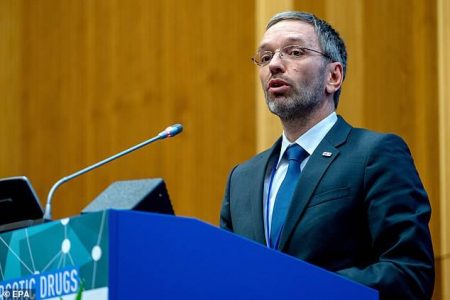
Austrian authorities demand its ISIS fighters are tried in the Middle East countries
Austria wants its citizens who have fought for ISIS to be tried in U.N.-style tribunals in the Middle East rather than brought home for prosecution.
U.S.-backed forces last month announced the capture of terror group’s last territory in Syria, eliminating its rule over a self-proclaimed ‘caliphate’.
But no clear international policy has emerged yet about how to deal with the militants captured there and at other strongholds.
Austria’s far-right interior minister, Herbert Kickl, today called for ‘tribunals in the region’ to be set up to deal with those who had left Austria and other European countries to join Islamic State, whom he referred to as ‘ticking time bombs’.
‘I have turned to the three EU commissioners responsible with the request that this be made into a pan-European project,’ Kickl told a news conference after a weekly cabinet meeting, adding that Germany, Sweden and Finland support the idea.
Roughly 100 ‘foreign fighters’ who had travelled from Austria were in Islamic State combat zones in Syria and Iraq at the start of the year, Austrian media reported in February, citing an estimate Austria’s main intelligence service.
However not all of those were believed to be Austrians.
The Interior Ministry declined to comment on that estimate, but Foreign Minister Karin Kneissl has said that among European Union countries and relative to its population Austria has one of the highest numbers of Islamic State fighters.
Kickl said it would be cheaper and more efficient to organise trials in the Middle East at special tribunals rather than hold individual trials in various European countries.
‘Just imagine, you would have to fly in witnesses from Iraq, Syria and elsewhere for a trial in Austria,’ Kickl said, adding that Austria was capable of trying these people but that would be ‘more complicated’.
‘If the European Commission can support it and if we can agree on cooperation with the United Nations we will use what was done in Rwanda as a model,’ Kickl said, apparently referring to the International Criminal Tribunal for Rwanda, a U.N. body based in the Tanzanian city of Arusha.
A government spokesman said Kickl’s proposal was supported by both Kickl’s far-right Freedom Party and Chancellor Sebastian Kurz’s conservatives, which together have taken a hard line on immigration and law-and order issues.
Source: Daily Mail





